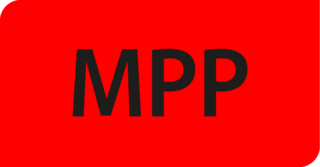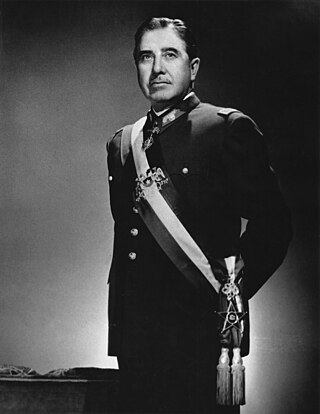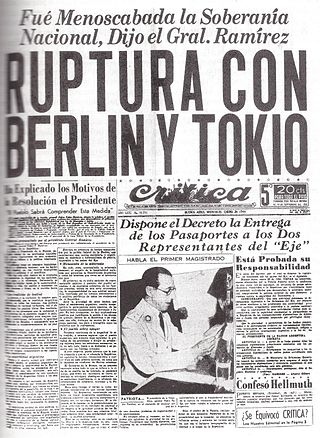
Uruguay, officially the Oriental Republic of Uruguay or the Republic East of the Uruguay, is a country in South America. It shares borders with Argentina to its west and southwest and Brazil to its north and northeast, while bordering the Río de la Plata to the south and the Atlantic Ocean to the southeast. It is part of the Southern Cone region of South America. Uruguay covers an area of approximately 181,034 square kilometers (69,898 sq mi) and has a population of around 3.4 million, of whom nearly 2 million live in the metropolitan area of its capital and largest city, Montevideo.

Operation Condor was a United States-backed campaign of political repression and state terrorism, involving intelligence operations, CIA-backed coups, as well as assassinations of left-wing sympathizers, liberals and democrats and their families in South America which formally existed from 1975 to 1983. Operation Condor was officially and formally implemented in November 1975 by the right-wing dictatorships of the Southern Cone of South America.

Jorge Rafael Videla was an Argentine military officer and dictator, Commander in Chief of the Army, member of the Military Junta, and de facto President of Argentina from 29 March 1976 to 29 March 1981. His reign, which was during the time of Operation Condor, was among the most infamous in Latin America during the Cold War due to its high level of human rights abuses and severe economic mismanagement.

The Dirty War is the name used by the military junta or civic-military dictatorship of Argentina for the period of state terrorism in Argentina from 1974 to 1983 as a part of Operation Condor, during which military and security forces and death squads in the form of the Argentine Anticommunist Alliance hunted down any political dissidents and anyone believed to be associated with socialism, left-wing Peronism, or the Montoneros movement.

The Revolutionary Left Movement is a Chilean far-left Marxist-Leninist communist party and former urban guerrilla organization founded on 12 October 1965. At its height in 1973, the MIR numbered about 10,000 members and associates. The group emerged from various student organizations, mainly from University of Concepción, that had originally been active in the youth organization of the Socialist Party. They established a base of support among the trade unions and shantytowns of Concepción, Santiago, and other cities. Andrés Pascal Allende, a nephew of Salvador Allende, president of Chile from 1970 to 1973, was one of its early leaders. Miguel Enríquez was the General Secretary of the party from 1967 until his assassination in 1974 by the DINA.
The Argentine Anticommunist Alliance was an Argentine Peronist and fascist political terrorist group operated by a sector of the Federal Police and the Argentine Armed Forces, linked with the anticommunist lodge Propaganda Due, that killed artists, priests, intellectuals, leftist politicians, students, historians and union members, as well as issuing threats and carrying out extrajudicial killings and forced disappearances during the presidencies of Juan Perón and Isabel Perón between 1973 and 1976. The group was responsible for the disappearance and death of between 700 and 1100 people.

Stefano Delle Chiaie was an Italian neo-fascist terrorist. He was the founder of Avanguardia Nazionale, a member of Ordine Nuovo, and founder of Lega nazionalpopolare. He went on to become a wanted man worldwide, suspected of involvement in Italy's strategy of tension, but was acquitted. He was a friend of Licio Gelli, grandmaster of P2 masonic lodge. He was suspected of involvement in South America's Operation Condor, but was acquitted. He was known by his nickname "il caccola" as he was just over five feet tall - although he stated that originally, the nickname came from his very young involvement, at age 14, in the Italian Social Movement (MSI), a neo-fascist political party established after the war

The Movement of Popular Participation is a Uruguayan political party. It is a member organisation of the left-wing Broad Front coalition.

Uruguayan Anarchist Federation is a Uruguayan anarchist organization founded in 1956. The FAU was created by anarchist militants to be a specifically anarchist organization. The FAU was the first organization to promote the organizational concept of Especifismo.

Augusto José Ramón Pinochet Ugarte was a Chilean military officer and politician who served as Chile's head of state under various titles from 1973 to 1990, first as the leader of the Military Junta of Chile from 1973 to 1981, being declared President of the Republic by the junta in 1974 and thus becoming the de facto dictator of Chile, and from 1981 to 1990 as de jure president after a new constitution which confirmed him in the office was approved by a referendum in 1980. His rule remains the longest of any Chilean leader.
The history of Argentina can be divided into four main parts: the pre-Columbian time or early history, the colonial period (1536–1809), the period of nation-building (1810–1880), and the history of modern Argentina.

Anti-communist mass killings are the politically motivated mass killings of communists, alleged communists, or their alleged supporters which were committed by anti-communists and political organizations or governments which opposed communism. The communist movement has faced opposition since it was founded and the opposition to it has often been organized and violent. Many anti-communist mass killing campaigns waged during the Cold War were supported and backed by the United States and its Western Bloc allies. Some U.S.-supported mass killings, including the Indonesian mass killings of 1965–66 and the killings by the Guatemalan military during the Guatemalan Civil War, are considered acts of genocide by some scholars.
In Argentina, there were six coups d'état during the 20th century: in 1930, 1943, 1955, 1962, 1966 and 1976. The first four established interim dictatorships, while the last two established dictatorships of permanent type on the model of a bureaucratic-authoritarian state. The latter conducted a Dirty War in the line of State terrorism, in which human rights were systematically violated and there were tens of thousands of forced disappearances.

The civic-military dictatorship of Uruguay (1973–85), also known as the Uruguayan Dictatorship, was an authoritarian military dictatorship that ruled Uruguay for 12 years, from June 27, 1973 until March 1, 1985. The dictatorship has been the subject of much controversy due to its violations of human rights, use of torture, and the unexplained disappearances of many Uruguayans. The term "civic-military" refers to the military regime's relatively gradual usurpation of power from civilian presidents who continued to serve as head of state, which distinguished it from dictatorships in other South American countries in which senior military officers immediately seized power and directly served as head of state.

Before the start of World War II in 1939, Argentina had maintained a long tradition of neutrality regarding European wars, which had been upheld and defended by all major political parties since the 19th century. One of the main reasons for this policy was related to Argentina's economic position as one of the world's leading exporters of foodstuffs and agricultural products, to Europe in general and to the United Kingdom in particular. Relations between Britain and Argentina had been strong since the mid-19 century, due to the large volume of trade between both countries, the major presence of British investments particularly in railroads and banking, as well as British immigration, and the policy of neutrality had ensured the food supply of Britain during World War I against the German U-boat campaign. At the same time, British influence over the Argentine economy was resented by nationalistic groups, while German and Italian influence in Argentina was strong and growing mainly due to increased interwar trade and investment, and the presence of numerous immigrants from both countries, which, together with the refusal to break relations with the Axis as the war progressed, furthered the belief that the Argentine government was sympathetic to the German cause. Because of strong divisions and internal disputes between members of the Argentine military, Argentina remained neutral for most of World War II, despite pressure from the United States to join the Allies. However, Argentina eventually gave in to the Allies' pressure, broke relations with the Axis powers on 26 January 1944, and declared war on 27 March 1945.

Human rights abuses in Chile under Augusto Pinochet were the crimes against humanity, persecution of opponents, political repression, and state terrorism committed by the Chilean Armed Forces, members of Carabineros de Chile and civil repressive agents members of a secret police, during the military dictatorship of Chile under General Augusto Pinochet from 1973 to 1990.
Jefferson Cardim de Alencar Osório was a Brazilian Army officer. He reached the rank of colonel and was purged from the army by AI-1 in the 1964 Brazilian coup d'état.

The hijacking of Aerolíneas Argentinas Flight 648 occurred on 28 and 29 September 1966 when a group of Argentine nationalists hijacked a civilian Aerolíneas Argentinas aircraft en route from Buenos Aires to Río Gallegos and forced the captain at gunpoint to land in the Falkland Islands in protest to the UK's presence on the islands. After landing, the hijackers raised the Argentine flag, took several islanders hostage and demanded the Governor of the Falkland Islands recognise Argentine sovereignty over the islands. On 29 September 1966, after negotiating through a Catholic priest, the hijackers surrendered and were returned to Argentina for trial.
Robert William Scherrer was an FBI agent posted in Latin America in the 1970s. Named by journalist John Dinges as an "intelligence centre all by himself", he had extensive sources in the intelligence communities and military across the countries of the Southern Cone, and was one of the agents transmitting information from local intelligence sources to the United States as part of Operation Condor. He later participated in investigations relating to Condor's international killings, and is one of John Dinges' sources. He was the person who, in 1979, revealed the existence of "phase 3" of Operation Condor, the programme of international assassinations.

María Emilia Islas Gatti was a Uruguayan political activist and anarchist, who disappeared in Buenos Aires in 1976.














